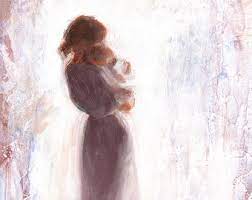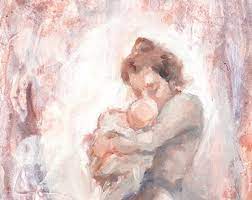In order to fully grasp the story’s true intention, and to better understand what’s happening beneath the many layers of lofty imagery and beautifully-spun allegories, “Mothers” needs to be read more than once. Twice perhaps. Three times for good measure. Machado’s portrayal of the grief and regret experienced after a failed relationship in a very non-linear way makes it all the more raw and emotional. Our narrator walks us through her experience of falling in love, living with, and then losing a woman appropriately named “Bad.” And at the end of their interaction, Bad gifts our narrator a baby, which I believe signifies the last of their connection, relationship, and love; perhaps it even symbolizes what might have been had they chosen to stay together.
 As our narrator cares for and nurtures this baby, we are given a lens into the world of motherhood and all the feelings that arise from this responsibility. She is burdened with the memories of her abusive and toxic relationship, unable to let go of the hold that Bad had on her. Thus, the baby is a product of this grief; a humanized and personified version of their failed love. Or a byproduct of her will to create the impossible, to outdo nature herself. Or both.
As our narrator cares for and nurtures this baby, we are given a lens into the world of motherhood and all the feelings that arise from this responsibility. She is burdened with the memories of her abusive and toxic relationship, unable to let go of the hold that Bad had on her. Thus, the baby is a product of this grief; a humanized and personified version of their failed love. Or a byproduct of her will to create the impossible, to outdo nature herself. Or both.
The ending of the story left me perplexed. We are introduced to a second child, to another family, and to a very vaguely outlined paragraph explaining the life of these children under their care. Yet I’ve come to the conclusion that the very last paragraph is pointed towards Bad, and the narrator is addressing her for a final time.
“Don’t leave the faucet on. You’ll flood the house, don’t do it, you promised it would never happen again. Don’t flood the house, the bills, don’t flood the house, the rugs, don’t flood the house, my loves, or we could lose you both. We’ve been bad mothers and have not taught you how to swim.”
I believe that she is talking to Bad – asking her not to flood the house with her abuse and anger; to disrupt the life they’ve crafted together, to destroy any chance they had at a happy and fulfilling ending. I see the mention of swimming to have multiple meanings; a double meaning. Through saying that they’ve not taught them how to swim, this might mean that they didn’t actually have the children. They were not able to conceive children, and the children are obviously a metaphor for their relationship; they were bad. Literally, figuratively, metaphorically. Their relationship didn’t last and they were never able to have the children or relationship that the narrator so desperately wanted.

Rachel: This is a lovely, insightful post. Does the story’s ending possibly suggest that the house in which she and Bad lived is now occupied by another family?